#Business Resources
Explore tagged Tumblr posts
Text
Start-up Business Tips

Can you detect issues that require bookkeeping services when there are so many business responsibilities and worries? And what are they specifically? Continue reading to learn more!
#1 Inefficient Financial Statements
Frequently, brought by inaccurate financial reporting and inconsistent data, one issue that small business owners deal with is inaccurate financial records. It could make your business appear prosperous when it is actually struggling financially!
Inaccurate financial reporting can have major, expensive risks, including losing investors, financial loss, and fraud risk.
They also make sure to give you a clearer, more complete picture of your company’s financial situation. You can get reasonably priced recordkeeping services in Los Angeles to get precise
#2 Overlooked Efforts
The possibility of making mistakes that cost you a lot of money is high if bookkeeping is not really your area of expertise. Sometimes, it may even take a lot of time and effort to correct!
Being in charge of everything yourself as a business owner may appear easier and more natural. But if you give it too much attention, you might forego other important business opportunities.
Hire The Bookkeepers R Us’s qualified and experienced bookkeepers to complete your books promptly and efficiently instead. Let our trustworthy recordkeepers in LA handle your bookkeeping needs so that you can focus your time and effort on running your business.
#3 Ineffective Cash Flow Management
Tracking your small business’s cash inflows and outflows can be challenging. Particularly if it starts to have an impact on your finances, such as by causing misaligned sales goals, huge loans, and other high expenditures
However, professional bookkeepers make sure that your cash flow is consistently tracked and that the priority is on profitability which boosts cash flow. The greatest solution for poor cash flow management is to outsource the skills of a bookkeeper. It is best to steer clear of recurring financial problems once a positive cash flow has been established!
The Bookkeepers R Us’ financial experts offer fresh ways to maintain your company’s financial stability and make sure your small business has enough ability to cover expenses like operations, renovations, and payroll.
#4 Overlapping Personal and Business Accounts
Combining two accounts might lead to significant losses and financial problems. So this is considered one of the major errors that small business owners make.
Combining personal and business financial accounts has consequences. Where there will be an instance where you may spend your personal funds on business expenses and vice versa.
Generally speaking, being in this kind of financial condition can limit your ability to expand your business to its best potential. Because you will fail to keep proper financial records and be unable to calculate your company’s profit margins with accuracy.
Consider opening a separate business bank account to prevent issues! Employ reputable LA bookkeepers to keep track of your company’s assets and offer you the best financial advice at every turn.
and updated accounting for all daily transactions, which will help you maintain organized financial reports.
#5 Ineffective Utilization of Accounting Software
Selecting the wrong accounting software could result in unwise business choices!
Although technology has made bookkeeping simpler, not all small business owners have the time or the expertise to use accounting software.
Even small businesses must use accounting software, such as various Inventory Management Systems, to operate at their peak efficiency. Why? Because it makes it simple to track spending, manage taxes, create balance sheets, and execute basic invoicing and billing.
4 notes
·
View notes
Text
Komersyo.com Transforms Professional Development for Filipinos
In a fast-paced world where professional success is often tied to the ability to continuously learn and adapt, Komersyo.com stands out as a transformative resource for Filipino adults seeking to elevate their careers and personal development. This innovative platform is reshaping how Filipinos access knowledge, offering a rich library of e-books, audiobooks, and other educational tools designed…
#audiobooks#business resources#e-books#Filipino professionals#Komersyo.com#lifelong learning#marketing and sales strategies#online learning platform#press release#professional development#skill-building tools
0 notes
Text
Australia’s new $600M cyber security strategy explained by an industry leader - CyberTalk
New Post has been published on https://thedigitalinsider.com/australias-new-600m-cyber-security-strategy-explained-by-an-industry-leader-cybertalk/
Australia’s new $600M cyber security strategy explained by an industry leader - CyberTalk


Sadiq is a cyber security consultant with over 20 years of industry experience. At Check Point, he leads the security pre-sales engineering team and specializes in advising organisations across the enterprise and critical infrastructure space. Sadiq also provides thought leadership across emerging cyber compliance and legislation in Australia; regularly delivering talks, webinars and publications on topics such as zero trust, the CI SOCI bill and the federal government’s cyber strategy.
Australia’s latest cyber security strategy is a comprehensive national initiative. It’s talked about as a ‘whole of nation’ endeavor. The goal is to fully fortify the nation’s government and business resources against cyber threats by 2030. In this interview, we discuss the proposed measures with expert Sadiq Iqbal. Don’t miss this!
How do you perceive and interpret the 2023-2030 Australian cyber security strategy, as it’s currently proposed?
The federal government’s seven-year cyber strategy appears to be carefully crafted and comprehensive. It will go a long way towards addressing the current vulnerability of Australian business and citizens, reducing future risk of cyber attacks.
It includes several reforms, such as tightening government maturity levels by developing a zero-trust culture. All government agencies will need to abide by the reforms, effectively mirroring the approach that the White House has taken in relation to U.S. government agencies. The proposal has also enhanced obligations for critical departments deemed ‘nationally significant’. Another welcome component is the strengthening of cyber obligations for the 11 sectors newly classed as critical infrastructure. This should address some of the shortcomings with the SOCI Act, as it will pressure-test the preparedness of relevant entities with cyber exercises and vulnerability assessments.
Thoughts about the Australian government’s financial investments in security?
The federal government’s commitment of an extra $600 million to counter cyber crime is instructive and instrumental, given the increasing frequency and severity of cyber attacks.
What is the most important thing for business leaders to take away from these reform proposals?
The government is heading in the right direction – ransomware is one of the most damaging potentialities for Australian businesses and consumers. Businesses need to follow-suit.
While improving visibility around ransomware, there are a variety of measures that enterprises can take in order to mitigate the threat.
We look forward to seeing how the government educates business leaders on these capabilities, especially when it comes to increasing cyber governance in the boardroom, in addition to assisting with attack remediation.
What is the Australian government doing to assist small businesses with their cyber security?
As you know, small businesses are one of the most targeted areas of late, on account of their lack of investment in cyber defenses. Several cost-free initiatives are on the table, such as cyber maturity assessments and incident response hotlines. Provided that the government can deliver on these initiatives, they’re great. There are over two million SMBs in Australia.
How do the proposed reforms align with Check Point’s methodology?
Many of the proposed reforms are in-line with Check Point’s approach and recommendations. The government now has a much stronger focus than previously on threat-intelligence sharing between entities, and also on blocking of threats, both in real-time and at scale, which eliminates the costly recovery exercise that eventuates when taking a cautious detection-only approach.
For more insights into federal cyber security
How can government agencies address cyber security challenges? – Watch clip
Find out about real tools that can assist you today – Downloadable resource
Lastly, please sign up for the CyberTalk.org newsletter – Here
#2023#approach#Australia#Business#Business Resources#Check Point#compliance#comprehensive#consumers#crime#critical infrastructure#cyber#cyber attacks#cyber crime#cyber security#cyber security strategy#Cyber Threats#defenses#detection#direction#engineering#enterprise#Exercise#Explained#financial#Future#governance#Government#how#incident
0 notes
Text
Business Resources | Marketing & Social Media Tips
https://www.onaplatterofgold.com
Achieve your business goals with ease Your 1 source for small business resources, entrepreneurship, business marketing, social media tips
1 note
·
View note
Text
powerful AI marketing tool

Tons of Desperate Buyers Need This Right Now! Learn More : https://urlr.me/K1NQb
1 note
·
View note
Photo

Creating a Culture of Learning in the Workplace What’s a culture of learning? A culture of learning is a healthy environment that places importance on and encourages new information and skills as a means of self-improvement. It helps employees continuously seek, share, and apply new knowledge and skills... The post Creating a Culture of Learning in the Workplace appeared first on Treehouse Blog. https://blog.teamtreehouse.com/creating-a-culture-of-learning
0 notes
Text
I’m not sure when exactly this happened, but I think it’s clear that the aro community really is a community, now.
For the longest time I’ve felt like we were still in stasis, not quite there; a proto-community, yes, but not quite a community. But we have more history now to lean back on, more of each other to talk to and laugh with and cry with and learn from. More people that’ll go forward and make a part of modern aro history. More people that believe us, believe in us, will stand with us if we ask them.
I wouldn’t consider myself an aro elder yet, though each year I’m surprised at how long aromanticism has been a part of my life, how long I’ve been free of doubt or insecurity about my aromanticism, how far we’ve come since I was questioning. Then again, when I was questioning, some of the people I looked up to for guidance were probably close to the age I am now, so I might be there sooner than I think.
And, I’m so so hopeful for all aros, young or old, new or not, because we’ve come so far. Day by day, progress is slow (and yes, it’s unfair, it should be so much faster), but looking back it feels fast. We are our own role models, the people we look up to for guidance. We carve our own path through life, making things up as we go. I used to find that terrifying, because I had no idea what the future would bring. But it’s actually amazing, because I can ignore all these silly “rules” and guidelines about what my life should be, and instead ask, “what do I want my life to be?”
Younger me, you have no idea how awesome your future is gonna be. I’m sorry about the pain and hardship you’ll go through first; it won’t be fair and you shouldn’t have to deal with it. But you’ll make it through, and one day you’ll be me. I can’t wait for you to get here.
#aromantic#aro#aspec#queer#lgbtq#original#text#can't believe i was busy on a day when aromantic got super trending#also on the topic of history: history is super important and we should make sure we're good custodians of it!#make backups of your tumblr blogs/wordpress sites/fanfiction/analytical essays/whatever!#save links into the internet archive/wayback machine!#future aros will thank us for every thing we save from link rot#current aros will thank us for keeping our resources alive and accessible
1K notes
·
View notes
Text
Thinking again about how many disabled people end up getting shunted into art/craft work because like. You can technically do it. Sometimes. Yeah you make a pittance at best and are almost certainly going to make your physical health worse by pushing yourself to get things done, but what else are you gonna do? You're too sick for anyone to hire you. You're "not sick enough" to qualify for benefits. Just devote every scrap of time and energy you have to a chronically underpaid, low-prestige, incredibly labor-intensive industry. A few people manage to make it work with luck and help and the right skills. Many people don't. Everyone gets pressured to monetize their hobbies, but it's especially insidious if you're disabled because any tiny thing you manage to accomplish to bring yourself joy gets twisted into proof that you should somehow be able to work.
#curseblogging#the thing is like#i went to bookbinding school#i saw what it was like to try to make a living as a craft worker for able-bodied people with significant starting resources#and the answer is: fucking hard!#people generally being like well if you work long hours and never allow yourself a break#and do a bunch of events and shows and teaching#and are good at not just the work but at finances and marketing and every other aspect of business management#(and ideally have a spouse with a regular job so you don't have to pay for your own healthcare. because this is America)#then maybe#MAYBE#you can make a reasonable living as a craftsperson#but this same VERY DIFFICULT PROFESSION#gets pushed on disabled people as something obvious and easy#and a lot of people do try their best to make it work because what other choice do they have?!
448 notes
·
View notes
Text
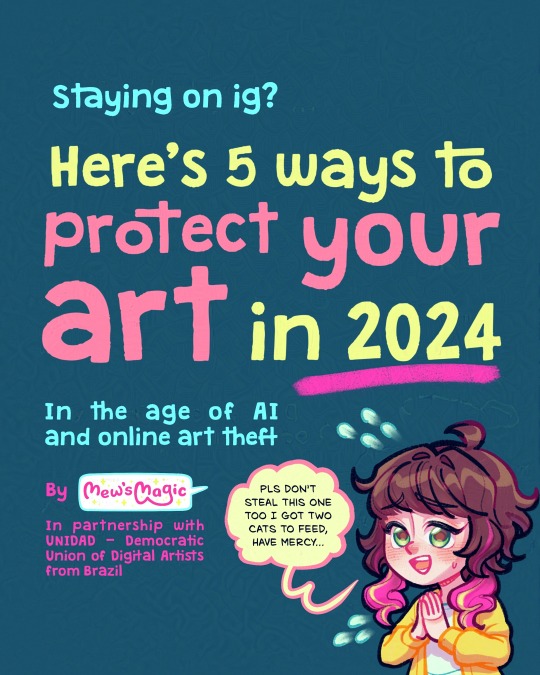
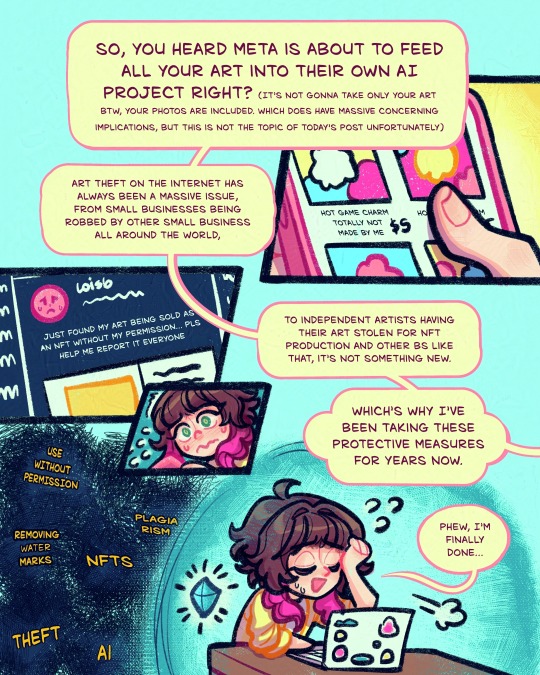
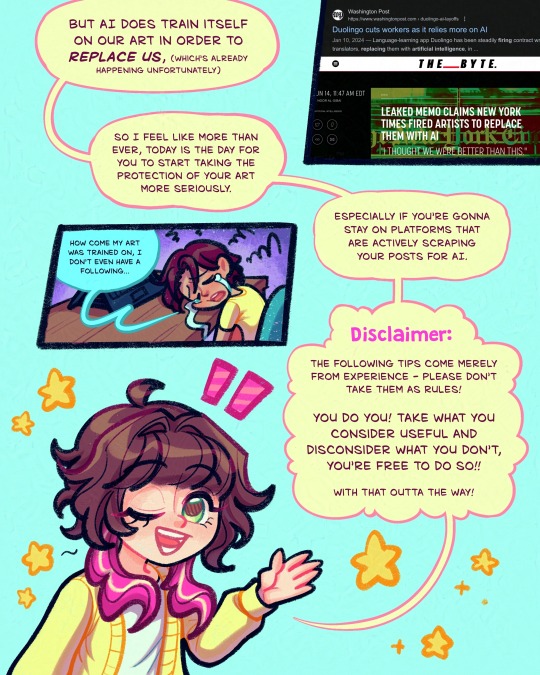
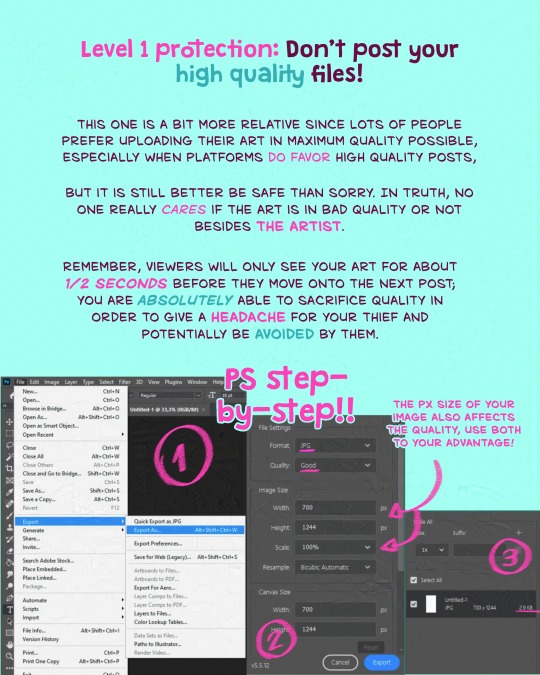
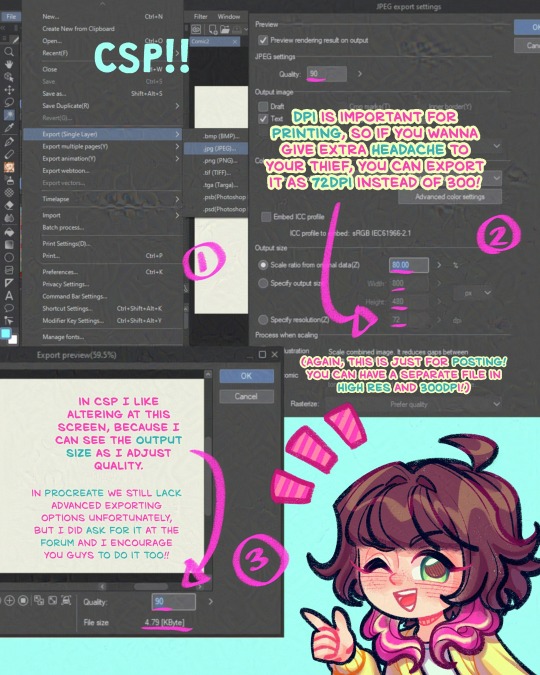
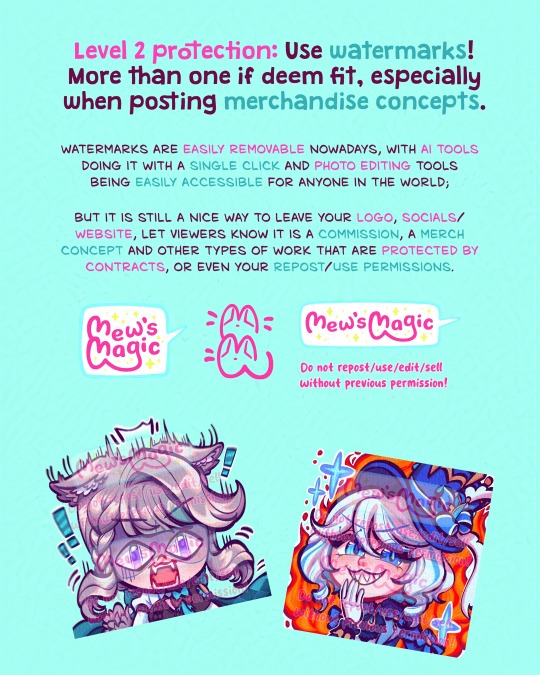
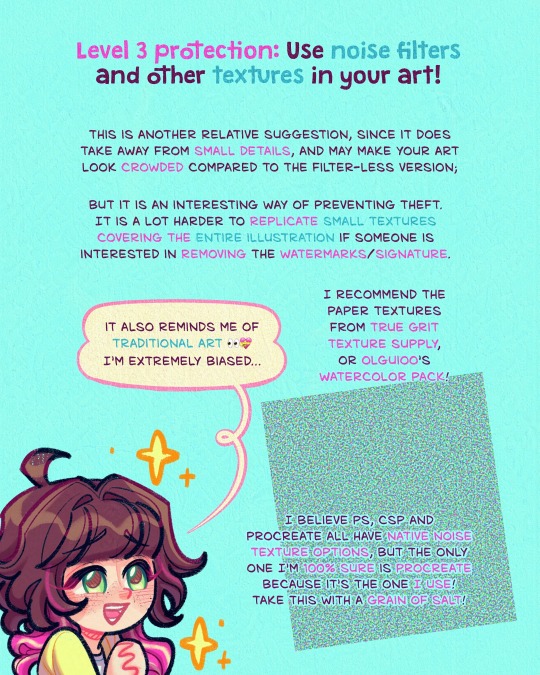
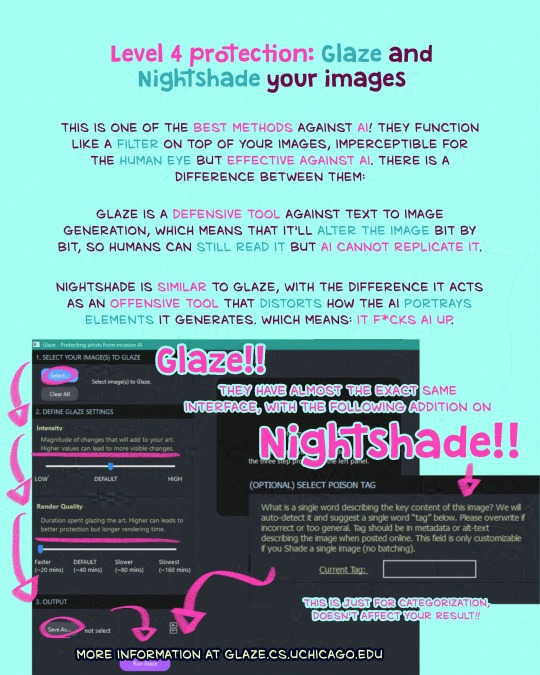
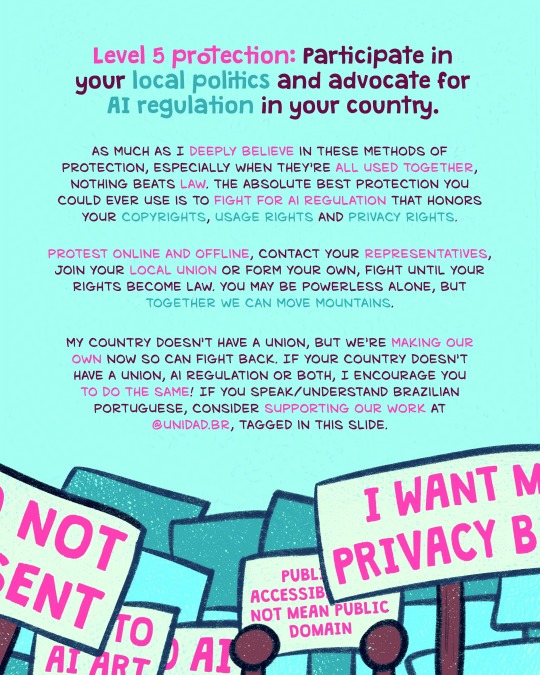
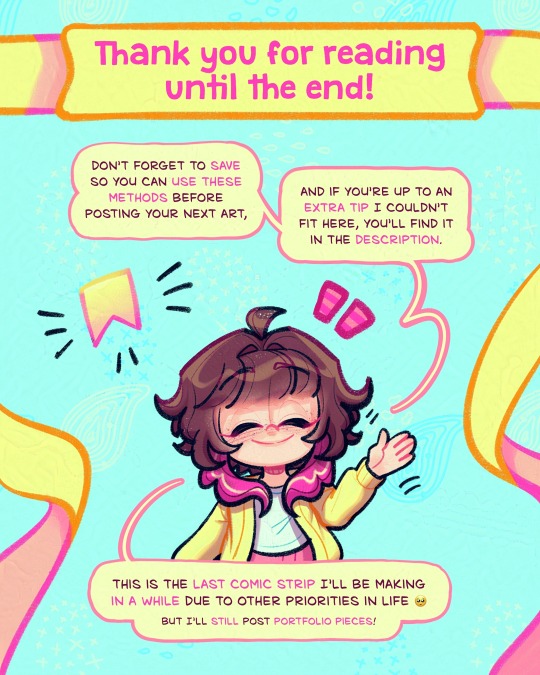
Here's a lil comic strip about how you can protect your art before sharing it to the public!!!
Against AI and against art theft too!
Click on 'read more' to see the extra tip I mentioned at the end!
Geez been working on this since the Meta AI things blew up but I only finished just now!!
Here's the extra tip I mentioned at the end:
you can use http://haveibeentrained.com to search for your images and find out if your work has been used for AI.
In there, you can choose to opt out, but AI companies are not obligated to respect it so it isn't too much of a protection unfortunately 😭
Also be aware that they are associated with AI and they did try to badmouth glaze so artists wouldn't protect themselves; which's very bad for a company that allegedly are on the side of the artists.
Also!!! There's a new type of AI that I was just made aware of last week, Copainter.
It completes unfinished work, which can be used for 'stealing and claiming it theirs', so put a cat picture in the next wips you post as well!
Funny protective measure I know LOLLLL but here's the tests for yall cynical people:
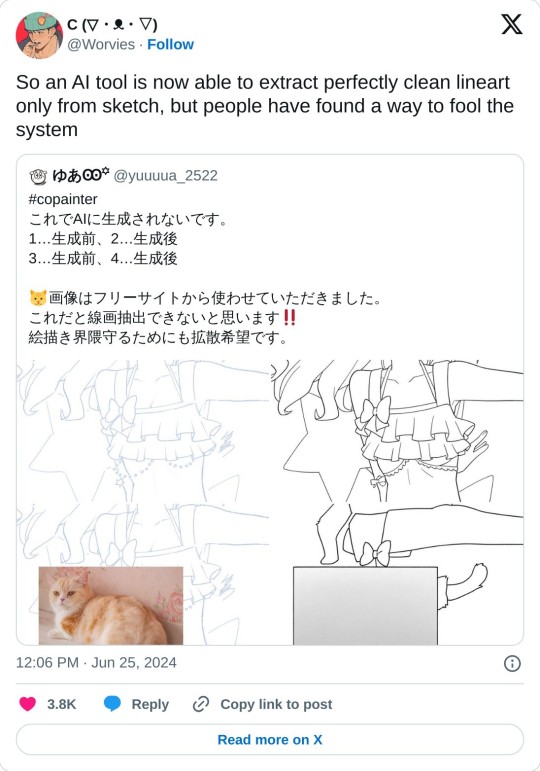
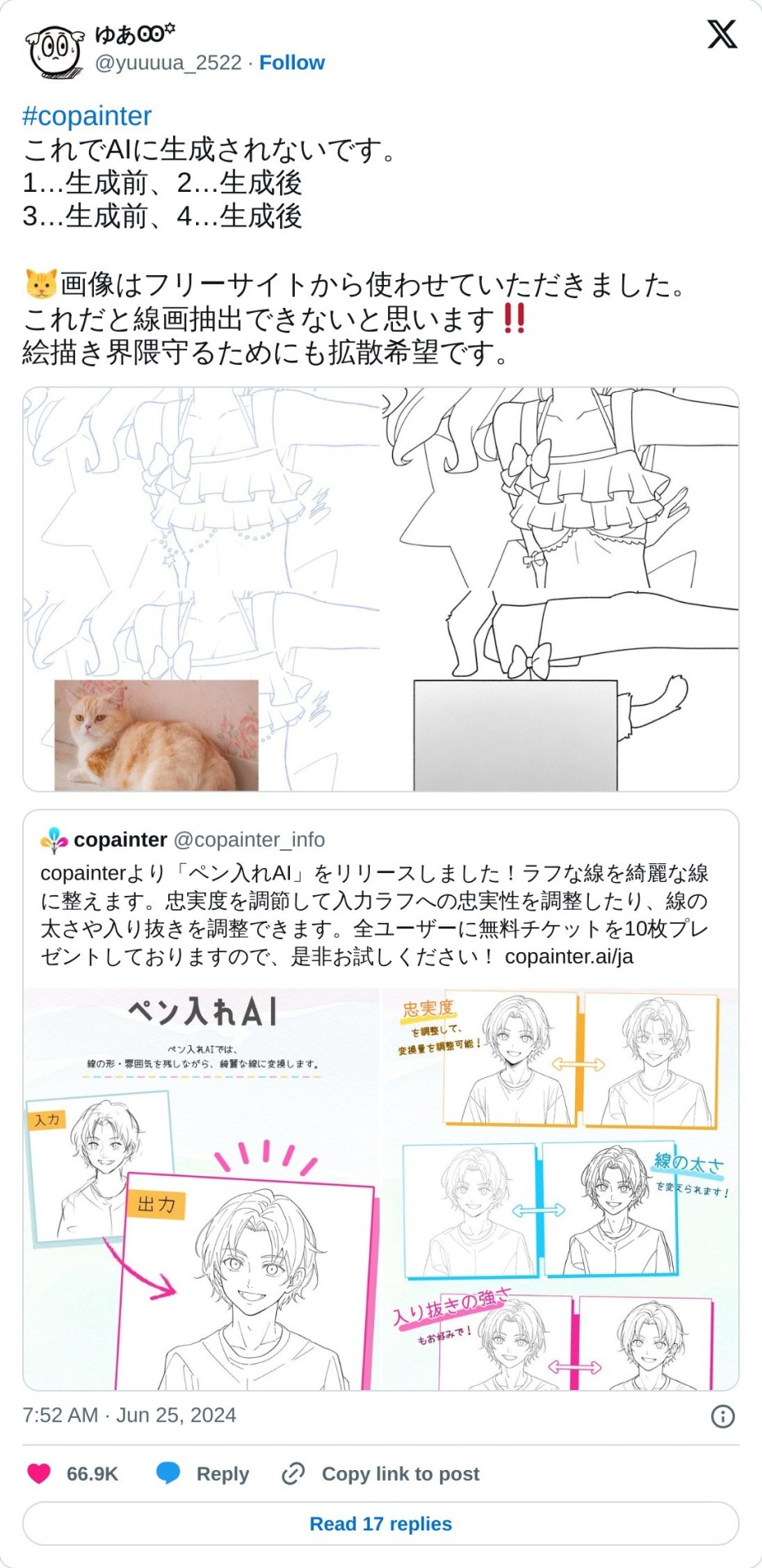
Perhaps I'll complete this comic with this info one day, but just these 10 slides took a looot of work so probably not happening anytime soon 😭
Thank you for reading everything though, I really appreciate it and hope this will help 🫶 be careful out there, privacy issues have been crazy recently!!!
#mews magical comics#comic strip#short comic#glaze#glazed art#nightshade#no ai art#no ai used#artists against ai#no to ai art#ai disturbance#how to protect your art#how to protect your art online#social media#social media is hell#art tutorials#tutorials#art resources#art tips#art help#art advice#support human artists#support small creators#support small artists#support small business#support artists#artist support
457 notes
·
View notes
Text






Lace divider stuff whatever
F2U with like & reblog , I edited pngs from Pinterest to make these. credit is greatly appreciated since this took me a solid 40 minutes
feel free to add to resource rentries, but it has to link back to this post or account.
tagging @smilepilled noticed you enjoy being tagged in things 🤍 unless i mistaked you for someone else
#꒰৯ ̇ ۪ dividers ۪ ྀི#lace dividers#rentry dividers#dividers#rentry icon#rentry tutorial#rentry template#rentry inspo#rentry resources#rentry stuff#rentry pixels#rentry gif#rentry decor#rentry graphics#rentry frame#rentry#carrd resources#f2u with credit#saeriji#template coming soon i promise i js want to post some resources.#postponing the template to be posted next week because i’m busy this week w church.#idk what else to tag#rentry carrd#carrd graphics#carrd inspo#carrd stuff#carrd#carrd decor#carrd dividers#carrd layouts
173 notes
·
View notes
Text
patience being tested. being forced by a bizarre unfortunate situation to adhere to university requirement technicality by taking this simple basic elementary "introduction to environmental history" class.
this class is from facilitators/program which do, like, "history of the American frontier" or "history of fishing and hunting" and still basically subscribe to that old-school twentieth-century idealization and celebration of characters like Teddy Roosevelt and reverence for a mythical arc-of-history-bent-towards-justice narrative of the often-clumsy but ultimately-benevolent US federal government and its mission to "save nature" through the miracle of "sustained yield," while heroic federal land management agencies and "heritage" institutions lead to way, staffed by exceptional individuals (appeals to nostalgia for the frontier and an imagined landscape of the American West; ego-stroking appeals to flattering self-image that center the environmentalist or academic). where they invoke, y'know, ideas like "ecology is important because don't you enjoy cross-country skiing in The Woods with your niece and nephew? don't you like hunting and fishing?" which makes it feel like a time capsule of appeals and discourses from the 1970s. and it invokes concept of "untouched wilderness" (while eliding scale of historical Indigenous environmental relationships and current ongoing colonial violence/extractivism). but just ever-so-slightly updated with a little bit of chic twenty-first-century flair like a superficial land acknowledgement or a reference to "labor histories" or "history from below," which is extra aggravating when the old ideologies/institutions are still in power but they're muddying the water and diluting the language/frameworks (it's been strange, watching words like "multispecies" and "Anthropocene" over the years slowly but surely show-up on the posters, fliers, course descriptions, by now even appearing adjacent to the agri-business and resource extraction feeder programs, like a recuperation or appropriation.) even from a humanities angle, it's still, they're talking at me like "You probably didn't know this, but environmental history is actually pretty entangled with political and social events. In fact, we can synthesize sources and glean environmental info from wacky places like workers' rolls in factories, ship's logs, and poetry from the era." and i'm nodding like YEP.
the first homework assignment is respond to this: "Define and describe 'the Anthropocene'. Do you think 'the Anthropocene' is a useful concept? Why or why not?" Respond in 300 words.
so for fun, right now in class, going to see how fast i can pull up discussion of Anthropocene-as-concept solely from my old posts on this microblogging site.
---
ok, found some
---
I think that the danger in any universal narrative or epoch or principle is exactly that it can itself become a colonizing force. [...] I’m suspicious of the Anthropocene as concept for the very reason that it subsumes so many peoples, nations, histories, geographies, political orders. For that reason, I think ideas like the Anthropocene can be a useful short-hand for a cluster of tangible things going on with the Earth at the moment, but we have to be very careful about how fluid and dynamic ideas become concretized into hegemonic principles in the hands of researchers, policymakers, and politicians. There’s so much diversity in histories and experiences and environmental realities even between relatively linked geographies here in Canada [...]. Imagine what happens when we try to do that on a global scale - and a lot of euro-western Anthropocene, climate change and resilience research risks doing that - eliding local specificities and appropriating knowledge to serve a broader euro-western narrative without attending to the inherent colonial and imperial realities of science and policy processes, or even attending to the ways that colonial capitalist expansion has created these environmental crises to begin with. While we, as a collective humanity, are struggling with the realities of the Anthropocene, it is dangerous to erase the specific histories, power-relations, political orders that created the crisis to begin with. So, I’m glad that a robust critique of the Anthropocene as a concept is emerging.
Text by: Words of Zoe Todd, as interviewed and transcribed by Caroline Picard. “The Future is Elastic (But it Depends): An Interview with Zoe Todd.” 23 August 2016.
---
---
---
The Great Acceleration is the latest in a series of human-driven planetary changes that constitute what a rising chorus of scientists, social scientists, and humanists have labeled the Anthropocene - a new Age of Humans. [...] But what the Anthropocene label masks, and what the litany of graphs documenting the Great Acceleration hide, is a history of racial oppression and violence, along with wealth inequality, that has built and sustained engines of economic growth and consumption over the last four centuries. [...] The plantation, Sidney Mintz long ago observed, was a “synthesis of field and factory,” an agro-industrial system of enterprise [...]. Plantation legacies, along with accompanying strategies of survival and resistance, dwell in the racialized geographies of the United States’ and Brazil’s prison systems. They surface in the inequitable toxic burdens experienced by impoverished communities of color in places like Cancer Alley, an industrial corridor of petrochemical plants running along the Mississippi River from New Orleans to Baton Rouge, where cotton was once king. And they appear in patterns of foreign direct investment and debt servitude that structure many land deals in the Caribbean, Brazil, and sub-Saharan Africa [...]. [C]limatologists and global change scientists from the University of London, propose instead 1610 as a date for the golden spike of the Anthropocene. The date marked a detectable global dip in carbon dioxide concentrations, precipitated, they argue, by the death of nearly 50 million indigenous human inhabitants [...]. The degradation of soils in the tobacco and cotton-growing regions in the American South, or in the sugarcane growing fields of many Caribbean islands, for example, was a consequence of an economic and social system that inflicted violence upon the land and the people enslaved to work it. Such violent histories are not so readily evident in genealogies that date the Anthropocene’s emergence to the Neolithic Revolution 12,000 years ago, the onset of Europe’s industrial revolution circa 1800, or the Trinity nuclear test of 1945. Sugarcane plantations were already prevalent throughout the Mediterranean basin during the late middle ages. But it was during the early modern era, and specifically in the Caribbean, where the intersection of emerging proto-capitalist economic models based on migratory forced labor (first indentured servitude, and later slavery), intensive land usage, globalized commerce, and colonial regimes sustained on the basis of relentless racialized violence, gave rise to the transformative models of plantations that reshaped the lives and livelihoods of human and non-human beings on a planetary scale. [...] We might, following the lead of science studies scholar Donna Haraway and anthropologist Anna Tsing, more aptly designate this era the Plantationocene. [...] It is also an invitation to see, in the words of geographer Laura Pulido, “the Anthropocene as a racial process,” one that has and will continue to produce “racially uneven vulnerability and death." [...] And how have such material transformations sustained global flows of knowledge and capital that continue to reproduce the plantation in enduring ways?
Text by: Sophie Sapp Moore, Monique Allewaert, Pablo F. Gomez, and Gregg Mitman. "Plantation Legacies." Edge Effects. 22 January 2019. Updated 15 May 2021. [Bold emphasis added by me.]
---
---
---
Geologists and other scientists will fight over [the definition of the beginning start-date of the Anthropocene] in scientific language, seeking traces of carbon dioxide that index the worst offenses of European empire which rent and violated the flesh, bodies, and governance structures of Indigenous and other sovereign peoples in the name of gold, lumber, trade, land, and power. [...] The stories we tell about the origins of the Anthropocene implicate how we understand the relations we have with our surrounds. In other words, the naming of the Anthropocene epoch and its start date have implications not just for how we understand the world, but this understanding will have material consequences, consequences that affect body and land.
Text by: Heather Davis and Zoe Todd. On the Importance of a Date, or Decolonizing the Anthropocene. ACME An International Journal for Critical Geographies. December 2017. [Bold emphasis added by me.]
---
---
---
From Aime and Suzanne Cesaire, C. L. R. James, Claudia Jones, Eduoard Glissant, through Sylvia Wynter, Christina Sharpe, and so many others, critical anticolonial and race theory has been written from the specific histories that marked the Black Atlantic. [...] Glissant also reminds us, secondly, of how cunning the absorptive powers of [...] liberal capitalism are - how quickly specific relations are remade as relations-erasing universal abstractions. [...] This absorptive, relations-erasing universalism is especially apparent in some contemporary discourses of […] liberalism and climate collapse - what some call the Anthropocene - especially those that anchor the crisis in a general Human calamity which, as Sylvia Wynter has noted, is merely the name of an overdetermined and specific [White] European man. […] [T]he condition of creating this new common European world was the destruction of a multitude of existing black and brown worlds. The tsunami of colonialism was not seen as affecting humanity, but [...] these specific people. They were specific - what happened to them may have been necessary, regrettable, intentional, accidental - but it is always them. It is only when these ancestral histories became present for some, for those who had long benefitted from the dispossession [...], that suddenly the problem is all of us, as human catastrophe.
Text by: Elizabeth Povinelli. “The Ancestral Present of Oceanic Illusions: Connected and Differentiated in Late Toxic Liberalism.” e-flux Journal Issue #112. October 2020.
---
The narrative arc [of White "liberal humanism"] [...] is often told as a kind of European coming-of-age story. […] The Anthropocene discourse follows the same coming-of-age [...] script, searching for a material origin story that would explain the newly identified trajectory of the Anthropos […]. Sylvia Wynter, W.E.B. DuBois, and Achille Mbembe all showed how that genealogy of [White subjecthood] was [...] articulated through sixteenth- through nineteenth-century [historiographies and discourses] in the context of colonialism, [...] as well as forming the material praxis of their rearrangement (through mining, ecological rearrangements and extractions, and forms of geologic displacements such as plantations, dams, fertilizers, crops, and introduction of “alien” animals). […] As Wynter (2000) commented, “The degradation of concrete humans, that was/is the price of empire, of the kind of [Eurocentric epistemology] that underlies it” (154).
Text by: Kathryn Yusoff. “The Inhumanities.” Annals of the American Association of Geographers, Volume 11, Issue 3. November 2020.
---
---
---
As Yarimar Bonilla suggests in regard to post-Irma-and-Maria Puerto Rico, “vulnerability is not simply a product of natural conditions; it is a political state and a colonial condition.” Many in the Caribbean therefore speak about the coloniality of disaster, and the unnaturalness of these “natural” disasters [...]. Others describe this temporality by shifting [...] toward an idea of the Plantationocene [...]. As Moore and her colleagues write, “Plantation worlds, both past and present, offer a powerful reminder that environmental problems cannot be decoupled from histories of colonialism, capitalism, and racism that have made some human beings more vulnerable [...].” [W]e see that contemporary uneven socioecologies associated with the rise of the industrial world ["the Anthropocene"] are based [...] also on the racialized denial and foreshortening of life for the sacrificial majority of black, brown, and Indigenous people and their relegation to the “sacrifice zones” of extractive industry. [...] [A]ny appropriate response to the contemporary climate emergency must first appreciate its foundations in the past history of the violent, coercive, transatlantic system of plantation slavery; in the present global uneven development, antiblackness, and border regimes that shape human vulnerability [...] that continues to influence who has access to resources, safety, and preferable ecologies [...] and who will be relegated to the “plantation archipelagoes” (as Sylvia Wynter called them) [...].
Text by: Mimi Sheller. “Thinking Beyond Coloniality: Toward Radical Caribbean Futures.” Small Axe (2021), 25 (2 (65)), pages 169-170. Published 1 July 2021. [Bold emphasis added by me.]
---
---
---
Indigenous genocide and removal from land and enslavement are prerequisites for power becoming operationalized in premodernity [...]; it was/is a means to operationalize extraction (therefore race should be considered as foundational rather than as periphery to the production of those structures and of global space). [...] Wynter suggests that we […] consider 1452 as the beginning of the New World, as African slaves are put to work on the first plantations on the Portuguese island of Madeira, initiating the “sugar-slave” complex - a massive replantation of ecologies and forced relocation of people […]. Wynter argues that the invention of the figure of Man in 1492 as the Portuguese [and Spanish] travel to the Americas instigates at the same time “a refiguring of humanness” in the idea of race. [...] The natal moment of the 1800 Industrial Revolution, […] [apparently] locates Anthropocene origination in […] the "new" metabolisms of technology and matter enabled by the combination of fossil fuels, new engines, and the world as market. […] The racialization of epistemologies of life and nonlife is important to note here […]. While [this industrialization in the nineteenth century] […] undoubtedly transformed the atmosphere with […] coal, the creation of another kind of weather had already established its salient forms in the mine and on the plantation. Paying attention to the prehistory of capital and its bodily labor, both within coal cultures and on plantations that literally put “sugar in the bowl” (as Nina Simone sings) […]. The new modes of material accumulation and production in the Industrial Revolution are relational to and dependent on their preproductive forms in slavery […]. In 1833, Parliament finally abolished slavery in the British Caribbean, and the taxpayer payout of £20 million in “compensation” [paid by the government to slave owners for their lost "property"] built the material, geophysical (railways, mines, factories), and imperial infrastructures of Britain and its colonial enterprises and empire. [...] A significant proportion of funds were invested in the railway system connecting London and Birmingham (home of cotton production and […] manufacturing for plantations), Cambridge and Oxford, and Wales and the Midlands (for coal). Insurance companies flourished [...]. The slave-sugar-coal nexus both substantially enriched Britain and made it possible for it to transition into a colonial industrialized power […]. The slave trade […] fashioned the economic conditions (and institutions, such as the insurance and finance industries) for industrialization.
Text by: Kathryn Yusoff. "White Utopia/Black Inferno: Life on a Geologic Spike". e-flux Journal Issue #97. February 2019. [Bold emphasis added by me.]
#sorry for being mean#instructor makes podcasts about cowboys HELP ME#and he recently won a New Business award for his startup magazine covering Democrat party politics in local area HELP#so hes constantly performing this like dance between new hip beerfest winebar coolness and oldfashioned masculinity#but hes in charge of the certificate program so i have to just shut up and keep my head down for approximately one year#his email address is almost identical to mine and invokes enviro history terms but i made mine long before when i was ten years old#so i could log in to fieldherpforum dot com to talk about enviro history of distribution range changes in local reptiles and amphibians#sir if you read my blog then i apologize ive had a long year#and i cant do anything to escape i am disabled i am constantly sick im working fulltime i have NO family i have NO resources#i took all of this schools graduate level enviro history courses and seminars years ago and ran the geography and enviro hist club#but then left in final semester because sudden hospitalization and crippled and disabled which led to homelessness#which means that as far as any profession or school is concerned im nobody im a retail employee#i was doing conference paper revisions while sleeping on concrete vomiting walking around on my cane to find outdoor wifi#and im not kidding the MONTH i got back into a house and was like ok going back to finish the semester the school had#put my whole degree program and department in moratorium from lack of funding#and so required starting some stuff from scratch and now feel like a hostage with debt or worsening health that could pounce any moment#to even get back in current program i was working sixteen hours a day to pay old library fines and had to delicately back out of workplace#where manager was straight up violently physically abusive to her vulnerable employees and threatened retaliation#like an emotional torturer the likes of which i thought existed only in cartoons#and the week i filed for student aid a massive storm had knocked out electricity for days and i was clearing fallen tree debris#and then sitting in the dark in my room between job shifts no music no phone no food with my fingers crossed and i consider it a miracle#sorry dont mean to dramatize or draw attention to myself#so actually im happy you and i are alive
134 notes
·
View notes
Text
Need more fics where sj!SQQ and a martial sibling gets stuck in a situation, and instead of them having a bonding moment or something stupid and emotionally healing, sj just pulls out a knife.
#mind you i eat up the emotionally healing tropes#i just think itd be very funny if#'oh no. im in a situation with my worst shixiong. we're at risk of losing our lives. please tell my mother i love her.'#and then the martial sibling(depending on the one)#would try to resolve any bad blood between themselves and sj#and sj just removes a hidden knife from the small of his back that wasnt confiscated or something#and just frees them#maybe he puts the knife through the jaw of a captor or a really formidable beast#svsss#and just goes 'what was shidi saying? i was busy being the only resourceful and useful person in the sect'#original shen qingqiu#shen jiu#cang qiong#og shen qingqiu#og sqq
188 notes
·
View notes
Text
Tools That Will Help You Start Your Business For Free
ChatGPT
Canva
Stan Store
Stripe
Tiktok
Mailchimp
Pinterest
Hubspot
Capcut
Webflow
Unsplash
Google Fonts
Notion
WooCommerce
Convertkit
Calendly
Zapier
Sendinblue
Mozbar
Google Trends
Framer
YouTube
Answer The Public
IFTTT
Buffer
Videoleap
Snaptik
Google Analytics
Keyword.io
Trello
Google Docs
Instagram
Twitter
Hootsuite
Pixabay
Pexels
Wave
Grammerly
Calendly
Xero
Product Hunt
Semrush
PlaceIT
Asana
Loom
Namelix
#resources#marketing tools#seo tools#business tips#start a business#small business#entrepreneurship#entrepreneur#startup#start up#business#make money from home#make money online#marketing#ecommerce#branding#digitalmarketing#business growth
2K notes
·
View notes
Text




Isolde ( R1999 ) Renders.
― Requested by: @drblacula. ― Please do not repost my renders without credit.
― Google Drive Link.
#𐐪 from praysia.#𐐪 by praysia.#𐐪 praysia's renders.#transparents#apologies this took forever with little to show for it#r1999 art is a pain to render and we've been busy / low energy#hopefully these suffice ^^#renders#transparent render#transparent png#rentry png#rentry resources#rentry stuff#isolde#reverse 1999#r1999#r1999 isolde#reverse 1999 isolde#editblr
370 notes
·
View notes
Text
For some weird reason, I've always been fascinated by how wildly different Sampo operates in the Underground vs the Overworld.
Sampo is present in both places and even in official sources, he's not really counted as one side or the other- now that the theory has been confirmed in-game, he's generally just lumped in with the Masked Fools.
But there really is a big difference!
Probably the most obvious and well known instance of Sampo's...business practices *cough burglary and fraud COUGH* in the Overworld is from the Belobog Museum event. In it, you don't find out Sampo is the main culprit until near the end, because Pela has to set up a sting just to catch him in the act. And that sting is necessary all because the initial suspect they arrested, Norbert, had pretty much no idea of his partner's identity. Sampo wouldn't even speak to him face-to-face.

And whereas Sampo is normally very pleasant and friendly with the trailblazer...when he thinks he's talking to Norbert here, he straight up says that they are NOT friends. Like he really shuts that shit DOWN.

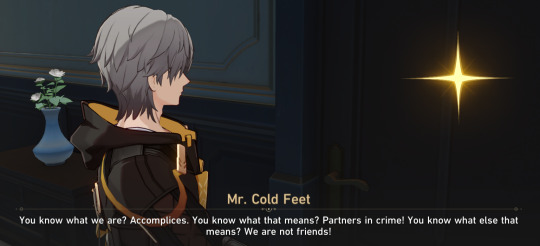
There's also an Overworld NPC, Chavez, who heads the "Dark Blue Scam Support Group." And he. Really really really does not like Sampo fjkdasjklfdj
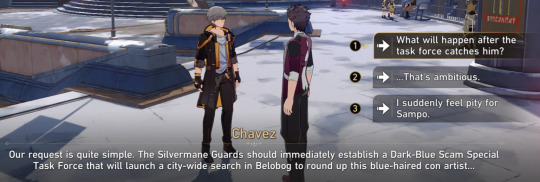
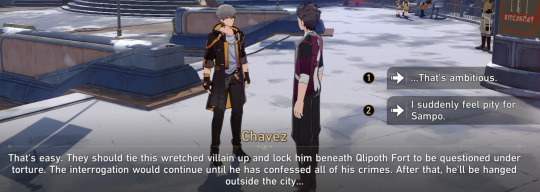
Chavez clearly wants Sampo caught, and has literally no positive feelings about him. So. Why call it the Dark Blue Scam? Why not just out him by name? Chavez obviously doesn't give a single shit about Sampo's dignity or privacy. But he never once refers to him as "Sampo," and even the pamphlets he passes out make no mention of it. No one in the entire support group seems to know how to identify him or how to refer to him except by his hair color. If the trailblazer says his name, Chavez reacts as though he's never heard it before.


(I've seen people say this means Sampo Koski is an alias and not his real name? But Ray pointed this out, and honestly I agree; even the Fools call him Sampo, after all. I think it's just that Chavez never knew Sampo's name in the first place, and given his immense distrust, immediately assumes it's an alias.)
And then there's his characters stories, where he proceeds to pull off a heist in the Overworld while in disguise as Brughel Poisson the entire time. Literally his own stories don't mention Sampo's name even once.
So anyway, all this shows that when he's up in the Overworld working cons, Sampo is incredibly slippery and secretive about his identity. The only people who seem to know him are Pela, Serval, and Gepard. He doesn't get close to anyone else, and is even surprisingly unfriendly. Nobody knows his name. No one knows his face. He has zero qualms about backstabbing or double-crossing, and even plans for it in some cases.
Meanwhile, down in the Underground, I'm pretty sure literally the worst thing we hear of him doing is scalping tickets in front of the Fight Club. Which isn't even illegal in a lot of places (although it's certainly a dick move).
In Hook's companion quest, a vagrant miner steals Fersman's equipment and tries to sell it to Sampo. Even before the trailblazer and Hook jump in and out the vagrant as a thief, Sampo hesitates to buy it because it sounds like stolen goods, which he doesn't want any part of.
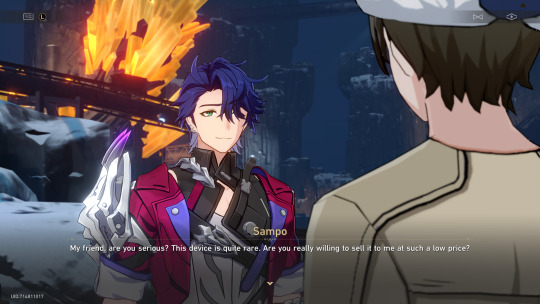
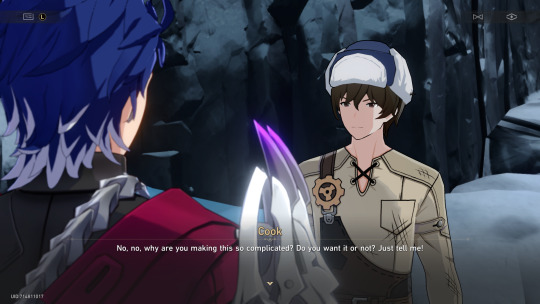
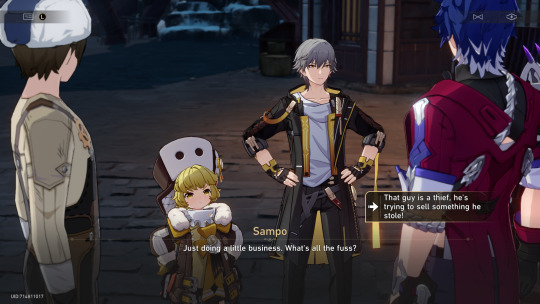
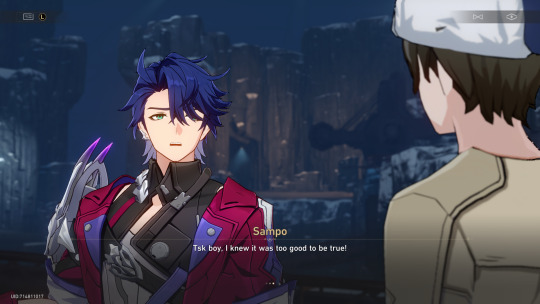
Even knowing that a geomarrow detector is rare and incredibly valuable in the mines, Sampo makes no attempt to double-cross Hook or profit off of her loss, and even tells her who to go to to get it fixed.
And my favorite example of Sampo in the Underground is the Survival Wisdom adventure mission. In it, Sampo starts up a business with Peak, another miner. And like. In wild contrast to all the cons he pulls above ground, Sampo is actually super nice and helpful here.
Just the same as with Hook's quest, Sampo talks to Peak face-to-face, with no disguises or barriers. When the trailblazer finds them, they're just in the Great Mine, no secretive meeting places. Peak knows Sampo, is familiar with him, and calls him by name. It's not even a con! There's nothing illegal going on; it really is just a business partnership. Peak is more than happy with their deal, he's even pretty enthusiastic about it, because thanks to Sampo he can now make enough money to get by while also accommodating his chronic fatigue.
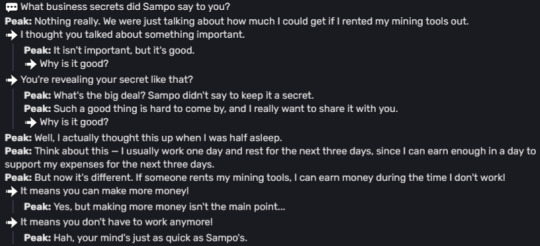
The only person Sampo lies to in this whole ordeal is the trailblazer, who he manipulates into getting Peak's mining equipment back from the vagrants that stole it in the first place. And when it's done, he rewards them with a legit treasure map.
So when he's working in the Underground, Sampo is MUCH more upright and lawful. Part of this is probably to do with his "business" model- Sampo only takes advantage of the wealthy, and poverty runs rampant in the Underground. When he charges Peak an extra 30% (the same percentage he charges Norbert as a consultation fee in the museum heists- Sampo seems to go by percentage instead of a flat rate, which means his prices are more fair for lower incomes) for carelessly losing their supply, Peak literally starts counting out pocket change.

Dude's working for pennies and good will down there dknsmdmd
And you can twist this into a Robin Hood thing if you want- Sampo IS technically working to feed orphans and heal the sick. He says himself he's more than happy to make up the shortfall between the greedy and the marginalized- I mean he says it in the shadiest way possible, but I doubt the people benefiting from his work really care that he's a slimeball if it means they can survive another day. Even the two heists he pulls in his character stories are literally just him stealing absurd amounts of food.
Personally though I think it is solely because of Natasha, and Sampo is hilariously well-behaved specifically for her, because she keeps him on a short leash JSKZJMSMSKS

#honkai star rail#sampotasha#hsr natasha#sampo koski#hsr sampo#hsr#today's post is brought to you by the letter Y. for the Yaps fdklsajfkd#'for some weird reason' I say only to realize through writing this post that the reason I like it so much is because I think-#-Natasha having Sampo by the short hairs is funny dkxjmskskdmdm#so sampotasha if you want or Sampo & Natasha if you want either or#I love Sampo behaving just for her because she holds a LOT of power in the Underground and he knows she could destroy him if she wanted#she could blacklist his business and run him out of Boulder Town if she really thought she needed to#Natasha exiled her own brother who eventually died in the cold because he was running unethical medical experiments on unknowing civilians#and granted what Sampo does is nowhere NEAR as bad as that but she also probably does not have nearly as much mercy for him dkdjdmkskd#I'd like to think they hold a decent amount of camaraderie for each other though. and maybe even some affection.#they work together like all the time after all. sampo is in the clinic with natasha so much that hook thought he was really sick.#and for as much as he relies on her for business she also relies on him for resources.#it's not really an exaggeration to say a LOT more people would be dead without Sampo constantly smuggling goods across the border.#maybe I should just make a post about their relationship sometime because I do very much love it skzjkskdk
216 notes
·
View notes
Text
Free Online Classes about Goat Farming
My friend Lee from Moxie Ridge Farm is hosting some free online courses about goat farming! If you have any interest in agriculture, homesteading, or are an author trying to get that goat farm AU off the ground, check them out!

Goat Care Basics
This is a course for those who have never worked with goats before. Perfect for those looking to start working with goats in their job and those looking to incorporate goats into their homestead or farm. By the end of this class, students will be ready to own and care for goats.

Behavioral Herdsmanship for Goats
When people ask me what my secret is with goats, I can now answer with this course. It is an intro to Behavioral Herdsmanship for goats and covers getting to know behavior on 3 levels as well as herding skills, moving goats, and more. This course is appropriate for those who have never worked with goats and those wishing to deepen their trust-based working relationship with goats.

Goat Kidding Basics
Kidding can be an important part of goat ownership for those who want milk or baby goats. This course teaches the basics of kidding and prepares students to attend their first goat birth.

Bottle Raising Baby Goats
Raising bottle babies can be both challenging and incredibly rewarding. This course walks students through post-birth care, selecting and using a bottle system, and how to play in order to raise safe and friendly goats. Appropriate for those wishing to learn to raise a single baby to several dozen for home or work.
These courses have been made possible by the Northeast Dairy Business Innovation Center and are a training series targeted at people who want to start working with goats either as owners or as a part of their jobs.
#goat farming#queer farmers#goat herdsmanship#farm training#free resources for farmers#learn to raise goats#goat agriculture#agricultural resources#resources for small farms#small farming classes#free classes for farmers#farm education#Northeast Dairy Business Innovation Center#Moxie Ridge Farm#queer-owned farms#goats#goat kidding#small farms#homesteading#resources for homesteading
117 notes
·
View notes